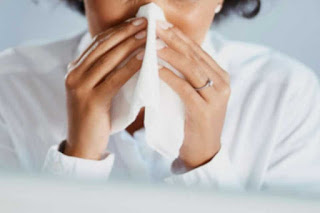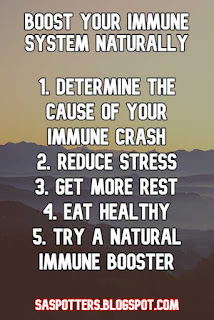 |
| Look after yourself |
How to boost your immune system
1. Determine the cause of your immune crash
2. Reduce stress
3. Get more rest
4. Eat healthy
5. Try a natural immune booster
 |
| Give your body its strength back. |
1) Determine what is hampering your immune system
If you’re feeling a little vulnerable at the moment, it could be because of something that you are going through.
Are you facing a stressful situation at work? Try doing things that will relax and de-stress you.
Have you had one or two too many late nights? Have a few early
nights to even out the balance.
There could also be a few things that you
do every day that negatively affects your immune system. If you get sick
regularly, it could be because of substances like cigarette smoke, alcohol or
medication.
You might have been eating too much junk food or consuming too much sugar lately.
Have you been depriving yourself from natural sunlight? Are you deficient in a specific nutrient?
Lack of exercise also causes your immune system to crash.
 |
| Clean up unhealthy things. |
2) Reduce stress
Too much stress will negatively affect your entire body, from muscle tissue to your immune system.
There are two main types of stress: mental stress and physical stress.
Mental stress
Mental stress releases a hormone called cortisol. Cortisol is good in small quantities because it primes your body for increased energy output.
Our cortisol levels are supposed to be the highest in the morning when we wake up and slowly taper off throughout the day until we go to bed in the evening.
Low cortisol levels lead to a decrease in energy levels. Too much cortisol from too much stress, though, can also wreak havoc on your body.
When you are stressed, your body cannot recover as efficiently because it is preparing for ‘fight or flight’.
If you are stressed out almost all of the time, your body uses less energy to heal itself. If mental stress is getting you down, use coping mechanisms like thinking about the stressful situation in a positive way.
Positivity reduces the amount of stress you will feel when doing a specific task. This will lower cortisol levels over time.
Make sure that you spend time doing something that you really enjoy like reading a book or catching up on a good TV series.
 |
| Make time to relax. |
Physical stress
Physical stress can also damage your immune system.
Exercise is really good for your health; but too much exercise, referred to as overtraining, can wear the body out at a faster rate than what it can recover from.
Increased frequency of colds and flu is actually one of the first signs that athletes are pushing their bodies too far.
This can lead to adrenal fatigue, muscle and energy loss, sleep problems (some people will crave sleep all the time, while others won’t be able to sleep at all) and decreased immune function.
If too much exercise is hampering your immune system, take a few days off and let your body recover.
I give myself a healthy rest week every two months or so to let my body recover fully.
When you get back to
your normal exercise routine, you’ll see how much rest you actually needed
because your physical performance will increase.
Lack of exercise can also lead to physical stress, because our bodies were made to move around regularly. Prolonged sitting times are linked to an increase in all diseases.
Staying in one position for too long will limit blood circulation.
If you sit too much at
work, try taking a stroll every few minutes. The improved blood circulation and
quick mental break will reduce mental stress while giving your overall moral a
boost.
Taking brisk walks during your office job can actually increase your work output.
 |
| Take breaks. |
3) Get more rest
Our bodies naturally go through cycles of activity and recovery.
If the balance swings too much in one direction, our health suffers.
Too much activity is as dangerous as too little. If you spend more time racing to complete the next task than you do relaxing and enjoying something, your body compensates by decreasing health.
Get some extra sleep for a few days to let your body catch up with your busy schedule. Make some time to power down and enjoy the moment that you are in right now.
If you can enjoy
at least one thing every day, your day not been wasted.
When was the last time that you did something that you really enjoyed? Think about a hobby or time spent with your friends and family.
When was the last time that you got a full night's sleep?
These things are not optional. Your life depends on them. Happiness and health and heavily intertwined.
 |
| Make time for happiness. |
4) Eat healthy
Over 70% of your immune system is in your gut.
Once you correct the balance between activity and recovery, you need to make sure that your body has the right nutrients to replenish and heal itself.
Good protein sources will help to rebuild muscle, bone, nerve, and brain and organ tissue. A healthy combination of protein, carbohydrates and fats will give your body the building blocks that it needs to replenish its energy stores.
Make sure to include lots of fruit and vegetables in your daily diet. They are packed with micro nutrients that we need like vitamins, minerals, phyto-nutrients, trace elements, fiber and anti-oxidants.
Try to eat at least 5 different servings of fruit or veg every day. If 5 servings is too much for you to handle right now, eat as many as you can and build up slowly towards your 5-a-day goal.
It is better to have
an apple and a banana today instead of nothing because the idea of 5 whole fruit
and veg intimidates you.
 |
| Maintain gut health. |
5) Try an immune booster
Green tea
A hot cup of green tea with a squeeze of lemon juice can do wonders for your immune system.
The antioxidants in green tea will regenerate your body on a cellular level while the amino acid, L-theanine, will protect the mind by helping it to relax.
If stress is disturbing your immune system, L-theanine will ease its effects.
Green tea is
anti-bacterial – and so is lemon juice. This can help fight against the germs
that are building up in your throat.
Glutamine
Glutamine is one of my favorite amino acids.
It is one of my top ways to speed up recovery when I actually get sick.
Exercise and stress decreases our natural glutamine levels. Supplementing with it helps the body to speed up recovery.
Glutamine can also increase sleep quality because it increases the levels of the neurotransmitter GABBA (gamma-aminobutyric acid).
GABBA is needed to relax and have a good
night’s sleep. You can find this supplement at health or supplement stores.
A good multi vitamin
A good multi-vitamin can help you to make sure that you are getting the micro nutrients that your body needs.
Although supplements should never replace a healthy diet, a multi-vitamin can
help you to make sure that your body gets all the right vitamins.
 |
| Choose natural remedies when you can. |
By cutting out unhealthy habits, reducing physical and mental stress, prioritizing rest and eating a healthy diet; you will give your immune system the raw materials that it needs to recover.
Remember to also replenish fluids by drinking enough water and make time to enjoy your everyday life. Stay Strong!
No comments:
Post a Comment